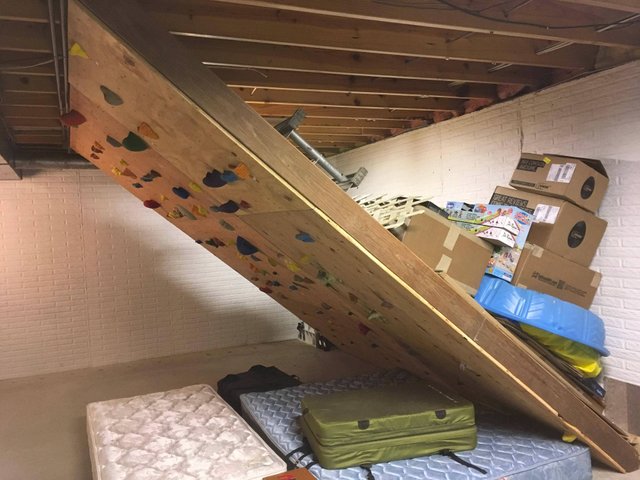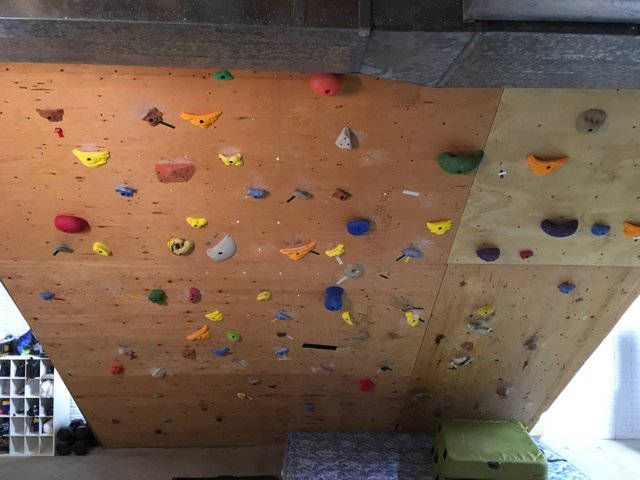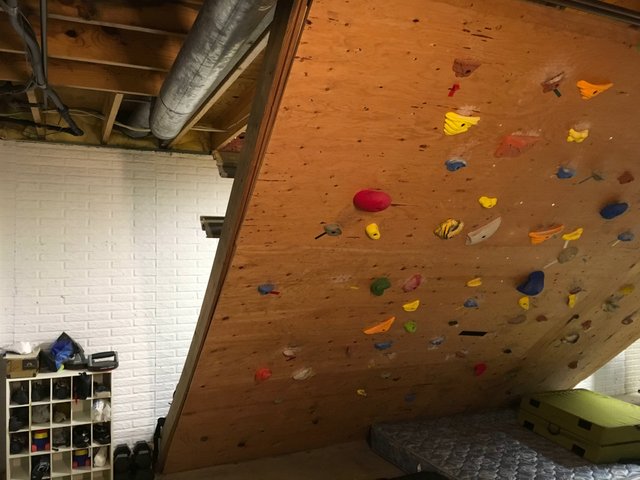Climbing Wall: My training wall in my basement: SUGGESTIONS?
So here is my training wall in my basement. It is 12 x 12 feet. With only 8 foot ceilings in the basement, you can see that it is fairly steep. It is a fun wall, and I do like overhung problems. However, it only offers so much utility. Sometimes it gets old having to start on this wall for training or just setting problems. I have a lot of holds I bought as seconds from various manufacturers, but it is still disappointing sometimes.

If anyone has any suggestions for increasing the utility of the wall such as:
-creative ways to set
-training routines that are fun on overhangs
-any other ideas

Let me know in the comments. I would really appreciate any ideas because every year this wall gets utilized less and less. I currently climb in the V5 range but would like to get back up a little higher again.

Thanks everyone!
Great Idea, Im going to look into building a climbing wall of my own
Hey why not.
Nice! That's close to what I had set up. Similar space to set on. I started to make it more interesting by constructing plywood volumes like little triangles to make new angles. Then I had to start putting worse and worse holds on there. I mean you can easily set a couple diagonal moves up to V10 on something like this, it's just up to your setting creativity. My training on something like this consisted of one or two moves at my peak. I would just tweak holds and moves until I was failing a lot and trying to do things that seemed ridiculous haha
How did I know you were going to say volumes. I thought about this. I really should go ahead and build one. I am trying to think of shape/location combos that would be good on this wall. I do have the carpentry skills to create some, but I am inexperienced at shape and placement.
Yea it just gives you a few more style options than hard crimps or really long movement to increase difficulty. If you have the ability to make a few the best way to utilize them I feel like is to use them as tension foot-holds or arete-style handholds. Or to put really really bad holds on so they're usable on that angle wall. Basically set stuff that makes you tighten the core a lot. Like smeared feet or little pancake friction footholds on textured volumes, two handed compression or opposition, etc. Low probability, high tension moves. That kind of thing is climber specific so I guess half the fun becomes finding your own limits and then frustrating yourself by setting what you believe to be impossible.
Thanks, makes sense.
I came here to say that you should add some volumes -- but @mk3jetta beat me to it. You could probably also get a bit creative and toss a couple holds around on the side to get some solid pinch action happening. It's tough to train strictly on overhung stuff though -- maybe put another sheet of plywood to the side and see if you can get some balance oriented problems on there too!
Side holds is a good idea. Thanks!
Yeah man! Some side holds, or maybe toss in a couple cheeky toe-hook opportunities in there too!
Yes. This will help extend some problems as well.
You could fill in the sides and get some more angles on it - going up an overhanging arete?
I had thought about this. It would definitely be a very easy expansion project. Of course, I would lose some storage. Ha.
Super cool and interesting !
Thank you.
Upvote my post and follow my channel so I can do same
https://steemit.com/@rafalklimsiak
If you want me to upvote your post make sure to add hashtag
#upvoteforupvote
Your basement is probably a bit too low but have you consider to try to squeeze there a MoonBoard? You could also make it by yourself but MoonBoard is standardized so you can download from Internet hundreds of custom boulder problems ready to be screw
Thanks!
I appreciate your revolutionary ideas about the house climbing that you have built for your practice. I really admire your efforts. I have also visited a site that is one of the best climbing wall manufacturers. They have manufactured climbing wall manufacturers, colleges, and universities. You can visit the site to learn more about it.